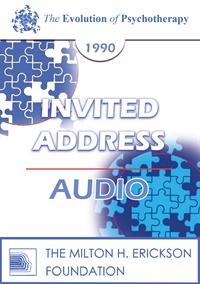
- Average Rating:
- Not yet rated
- Topic Areas:
- Invited Addresses | Gestalt | Psychotherapy | Therapist Development
- Categories:
- Evolution of Psychotherapy | Evolution of Psychotherapy 1990
- Faculty:
- Erving Polster, PhD | Ernest Rossi, PhD
- Duration:
- 1 Hour 24 Minutes
- Format:
- Audio Only
- Original Program Date:
- Dec 15, 1990
- Short Description:
- The concept of the Self has come to imply a consistent cluster of characteristics which are often given fixed and universal attributes, such as the narcissistic self, topdog and underdog, false and true self, etc. This paper will expand the concept to include the versatility and unique aliveness of the individual's many selves and show how these selves help people make sense of their lives. Special attention will be given to broadening the concepts of introjections, transference, and gestalt formation, showing how these may be instrumental in harmonizing alienated selves.
- Price:
- $15.00 - Base Price
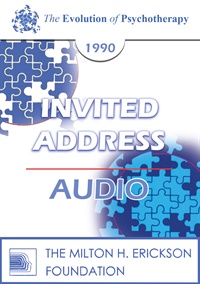
- Average Rating:
- Not yet rated
- Topic Areas:
- Invited Addresses | History of Psychotherapy | Psychotherapy | Therapist Development
- Categories:
- Evolution of Psychotherapy | Evolution of Psychotherapy 1990
- Faculty:
- Rollo May, PhD | James Hillman, PhD
- Duration:
- 1 Hour 6 Minutes
- Format:
- Audio Only
- Original Program Date:
- Dec 16, 1990
- Short Description:
- Epicurus, Kierkegaard, and Nietzsche are forefathers of contemporary psychotherapy. Freud was aware of these wellsprings of modern therapy, and Jung brings them specifically into his writing and his methods. We not only get hints from these forefathers, but we also find a lasting base in them, such as Bubar's "l-thou" construct or Kierkegaard's emphasis on the ultimate relationship of the self to life. These ideas are assumed in Freud, Jung, Adler, Rank, Fromm and other leading therapists in our day. It is these latter therapists who have given us the web of ideas which underlie contemporary psychotherapy.
- Price:
- $15.00 - Base Price
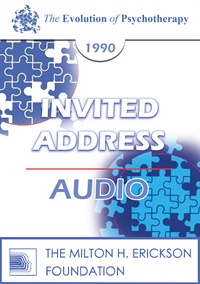
- Average Rating:
- Not yet rated
- Topic Areas:
- Invited Addresses | Psychotherapy | Therapist Development
- Categories:
- Evolution of Psychotherapy | Evolution of Psychotherapy 1990
- Faculty:
- James Bugental, PhD | Erving Polster, PhD
- Duration:
- 1:30:07
- Format:
- Audio Only
- Original Program Date:
- Dec 16, 1990
- Short Description:
- Human experience and human action center in and derive from human subjectivity. Our preoccupation with objectivity results displaces identity from inner living to external. Life-changing psychotherapy requires centered awareness and self-direction. Three therapeutic elements are prime: Full presence, major commitment, and exploring client's self-and-world constructs.
- Price:
- $15.00 - Base Price
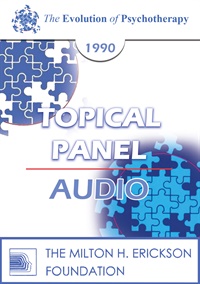
- Average Rating:
- Not yet rated
- Topic Areas:
- Topical Panels | Psychotherapy | Therapist Development | Training
- Categories:
- Evolution of Psychotherapy | Evolution of Psychotherapy 1990
- Faculty:
- James Bugental, PhD | Arnold Lazarus, Ph.D. | Salvador Minuchin, MD | Miriam Polster
- Duration:
- 54 Minutes
- Format:
- Audio Only
- Original Program Date:
- Dec 13, 1990
- Short Description:
- Topical Panel 05 from the Evolution of Psychotherapy 1990 - Training Psychotherapists Featuring James FT Bugental, PhD; Arnold Lazarus, PhD; Salvador Minuchin, MD; and Miriam Polster, PhD. Moderated by Ellyn Bader, PhD.
- Price:
- $15.00 - Base Price
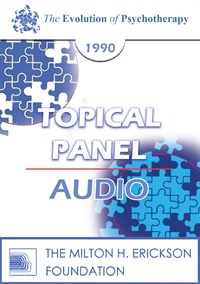
- Average Rating:
- Not yet rated
- Topic Areas:
- Topical Panels | Psychotherapy | Therapist Development
- Categories:
- Evolution of Psychotherapy | Evolution of Psychotherapy 1990
- Faculty:
- William Glasser, MD | James Hillman, PhD | Ernest Rossi, PhD | Paul Watzlawick, PhD
- Duration:
- 59 Minutes
- Format:
- Audio Only
- Original Program Date:
- Dec 13, 1990
- Short Description:
- Topical Panel 06 from the Evolution of Psychotherapy 1990 - The Language of Human Facilitation Featuring William Glasser, MD; James Hillman, PhD; Ernest Rossi, PhD; and Paul Watzlawick, PhD. Moderated by Betty Alice Erickson-Elliott, MS.
- Price:
- $15.00 - Base Price
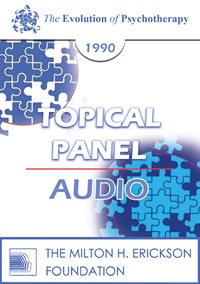
- Average Rating:
- Not yet rated
- Topic Areas:
- Topical Panels | Law & Ethics | Psychotherapy | Therapist Development
- Categories:
- Evolution of Psychotherapy | Evolution of Psychotherapy 1990
- Faculty:
- Jay Haley, MA | Rollo May, PhD | Thomas Szasz, MD | Jeffrey Zeig, PhD
- Duration:
- 1 Hour 1 Minutes
- Format:
- Audio Only
- Original Program Date:
- Dec 14, 1990
- Short Description:
- Topical Panel 09 from the Evolution of Psychotherapy 1990 - Key Ethical Considerations Featuring Jay Haley, MA; Rollo May, PhD; Thomas Szasz, MD; and Jeffrey K Zeig, PhD. Moderated by Bill O'Hanlon, MS.
- Price:
- $15.00 - Base Price
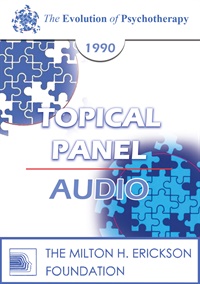
- Average Rating:
- Not yet rated
- Topic Areas:
- Topical Panels | Humor | Psychotherapy | Therapist Development
- Categories:
- Evolution of Psychotherapy | Evolution of Psychotherapy 1990
- Faculty:
- Arnold Lazarus, Ph.D. | Miriam Polster | Carl Whitaker, MD | Cloe Madanes, HDL, LIC
- Duration:
- 58 Minutes
- Format:
- Audio Only
- Original Program Date:
- Dec 15, 1990
- Short Description:
- Topical Panel 10 from the Evolution of Psychotherapy 1990 - Therapeutic Uses of Humor Featuring Arnold Lazarus, PhD; Miriam Polster, PhD; Carl Whitaker, MD; Cloe Madanes, Lic Psychol. Moderated by Michael Yapko, PhD.
- Price:
- $15.00 - Base Price
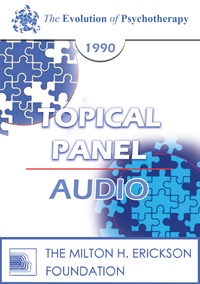
- Average Rating:
- Not yet rated
- Topic Areas:
- Topical Panels | Transference / Countertransference | Therapist Development
- Categories:
- Evolution of Psychotherapy | Evolution of Psychotherapy 1990
- Faculty:
- Alexander Lowen, MD | James F. Masterson, MD | Rollo May, PhD | Erving Polster, PhD
- Duration:
- 1 Hour
- Format:
- Audio Only
- Original Program Date:
- Dec 15, 1990
- Short Description:
- Topical Panel 11 from the Evolution of Psychotherapy 1990 - Transference / Countertransference Featuring Alexander Lowen, MD; James Masterson, MD; Rollo May, PhD; and Erving Polster, PhD. Moderated by Ruth McClendon, MSW.
- Price:
- $15.00 - Base Price
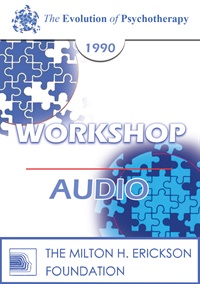
- Average Rating:
- Not yet rated
- Topic Areas:
- Workshops | Interviewing | Psychotherapy | Therapist Development
- Categories:
- Evolution of Psychotherapy | Evolution of Psychotherapy 1990
- Faculty:
- James Bugental, PhD
- Course Levels:
- Master Degree or Higher in Health-Related Field
- Duration:
- 2:31:28
- Format:
- Audio Only
- Original Program Date:
- Dec 12, 1990
- Short Description:
- Workshop 04 from the Evolution of Psychotherapy 1990 - Fostering Depth in Client Self-Exploration, featuring James FT Bugental, PhD. It is doubtful any lasting life-changes will result unless clients are able to access their own inner worlds with unusual depth. This workshop - using direct instruction, specific suggestions, and live demonstrations - teaches ways of working for rich inner discovery.
- Price:
- $15.00 - Base Price
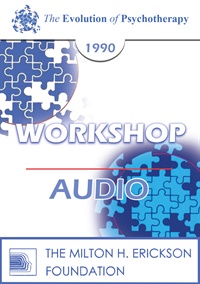
- Average Rating:
- Not yet rated
- Topic Areas:
- Workshops | Psychotherapy | Therapist Development
- Categories:
- Evolution of Psychotherapy | Evolution of Psychotherapy 1990
- Faculty:
- Arnold Lazarus, Ph.D.
- Duration:
- 2 Hours 23 Minutes
- Format:
- Audio Only
- Original Program Date:
- Dec 12, 1990
- Short Description:
- This workshop will underscore the need to go beyond AFFECT, BEHAVIOR, and COGNITION, and also assess client's IMAGERY, SENSATIONS, INTERPERSONAL RELATIONS, and BIOLOGICAL issues. By doing so, the result is a comprehensive and versatile framework for "leaving no stone unturned. ''
- Price:
- $15.00 - Base Price
Please wait ...

